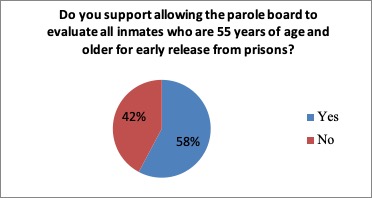 I have met with advocates on the issue of Elder Parole and Fair and Timely Parole on a number of occasions in light of the bills that have been proposed in the NYS Legislature. My answer as to whether I support these bills is more complicated than a simple yes or no as the issue is important and requires deliberation, which I am sharing below.
I have met with advocates on the issue of Elder Parole and Fair and Timely Parole on a number of occasions in light of the bills that have been proposed in the NYS Legislature. My answer as to whether I support these bills is more complicated than a simple yes or no as the issue is important and requires deliberation, which I am sharing below.
In my most recent constituent survey, I asked the following question:
There are groups that are advocating for and legislation that would allow early release of elderly New York inmates who are 55 years of age and older out of prisons and onto early parole. Do you support allowing the parole board to evaluate all inmates who are 55 years of age and older for early release from prisons?
With each question, I ask responders to provide the justification or answer explaining why they responded the way that they did. The reason I do that is that each issue is nuanced and cannot necessarily be fully explained in a one-sentence question. As much as I try to ensure that the questions are objective, understanding the reasoning behind a response is necessary since the language of legislation varies on issues and I like to understand the driving force behind the answer.
While 58% of responders did say they were in favor of early release based on the question I asked, I was not able to include details from the different proposals in the question. There were many people who answered that their “yes” answer only applied to those who were charged with nonviolent crimes. The current bills being proposed would apply to all crimes no matter the nature, even violent ones. Other responders said they would need to know the specific crimes that were committed to say yes to the question. There were some people who said they trust the parole board to make the right decision on a case-by-case basis and that there should not be a blanket release.
On the other hand, there were some people who stated it is an issue of justice and the humane thing to give people a second chance. Others said their age would prevent them from being likely to re-offend. Some responders said the age for parole consideration should be higher than 55 years old.
A sentiment that I have shared with the groups that I have met with is that I understand how systemic racism has led to unjust sentences that disproportionately impact the Black and Brown communities. I agree with the goals of what these bills seek to achieve generally to address these issues, my concern was whether there were adequate safety protections in place.
I am a person of faith as many know. That faith has been called into question many times, especially when I vote on contentious issues that come up. I fully believe in redemption and that people can change and turn their lives around. I also understand that there are many unfair circumstances and situations that lead to a person committing and being convicted of a crime. The stories that people discuss of their loved ones who are in prison and how they have changed and grown are absolutely compelling.
From another viewpoint, if you go to Unity House in Troy, the windows are covered with names and stories of women who were killed in domestic violence situations. They are absolutely heart-wrenching to read. You read about the dreams that these women had, their hopes for their future, about their children, and you cannot imagine the grief their loved ones must be enduring. The uptick in violent crime and domestic violence deaths during the COVID-19 pandemic has been concerning. This is not meant to advocate putting people in prisons, but there is the component of what people feel about what is a just and fair penalty in these situations and thinking about the victims and loved ones of the victims in these situations who may have concerns for their own safety.
Forgiveness is extremely complicated and no one is in a position to tell any person how to handle their grief and anger. Look at the people who lost their loved ones in nursing homes during the COVID-19 pandemic, there are calls for accountability but what is deemed to be accountability when you have lost a loved one is subjective. This is why we have a criminal justice system to be the final arbiter, however flawed it may be at times. The Parole Board is tasked with looking at a myriad of factors when determining whether parole should be granted, including among other things letters of support or opposition from the loved ones and families of a crime victim.
The scenario that I think makes sense to many is that a person who commits a crime at a young age has been in prison, has made a difference, and turned their life around to be eligible for parole at 55. The other scenario that may be an issue for some is a person who commits a violent crime, say at the age of 40 and serving a life sentence automatically being eligible for parole 15 years later. Granted even if that person is not granted parole by the parole board, that scenario might not sit well with some of the survey respondents. I say this because some of the responders to the survey also said they do not trust the parole board to make fair decisions.
There is a system in place where Black and Brown people are incarcerated and wrongfully convicted of crimes at disproportionate rates. The goal is to address that, but if there is doubt as to whether the Parole Board is acting fairly in the first place, what is the correct solution? Will it address the root of the problem or will the systemic issues also be a factor in release decisions, for instance in the cases of racially motivated crimes?
Am I saying that our current criminal justice system is an effective deterrent to crime? No. Do I believe that we need to look at crime with a restorative justice lens? Absolutely. I also understand that some will have difficulty wondering where the input of the victim’s loved ones fits into the decision-making process for release.
The Fair and Timely Parole bill would seem to address the problem with the current standard applied in parole cases. As a recent Times Union article noted, it is problematic if the Parole Board remains focused on the underlying crime, which will never change, rather than how much the person who is incarcerated has actually changed. The purpose of parole is to determine whether the incarcerated person is safely able to re-enter society so long as they are not a public safety risk. This legislation focuses on the safety and risk to the community rather than further judgment on the underlying crime.
Two of the most frequently discussed bills are linked below:
Elder Parole bill and memo:
Fair and Timely Parole bill and memo:
Objectively, there are many items to consider with legislation. It is not always a certain Yes or a certain No. As always, I am happy to listen and welcome any feedback that you have. Feel free to contact me through the office at 518-455-4474 or better yet share your thoughts via email that comes directly to me at mcdonaldj@nyassembly.gov


Recent Comments